新概念英语第二册-lesson-4-笔记和答案
- 格式:doc
- 大小:25.00 KB
- 文档页数:7
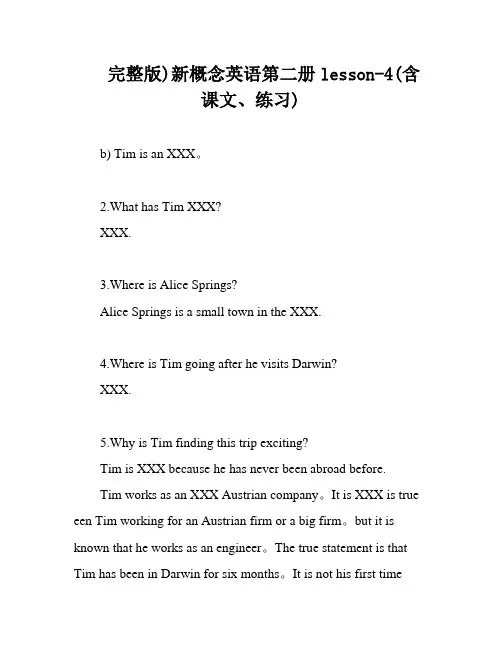
完整版)新概念英语第二册lesson-4(含课文、练习)b) Tim is an XXX。
2.What has Tim XXX?XXX.3.Where is Alice Springs?Alice Springs is a small town in the XXX.4.Where is Tim going after he visits Darwin?XXX.5.Why is Tim finding this trip exciting?Tim is XXX because he has never been abroad before.Tim works as an XXX Austrian company。
It is XXX is true een Tim working for an Austrian firm or a big firm。
but it is known that he works as an engineer。
The true statement is that Tim has been in Darwin for six months。
It is not his first timetraveling abroad。
as he is XXX is not in the center of Australia。
and there is no n given about Tim'XXXXXX。
Tim has been in Australia for six months。
and it is unclear how long he will stay。
His XXX。
XXX an Australian car。
but there is no n given about when he bought it。
Tim has never been to Alice Springs before。
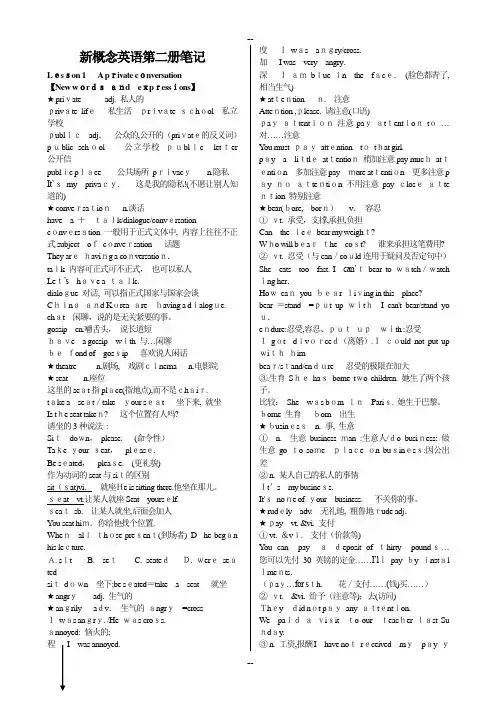
新概念英语第二册笔记Lesson 1 A private conversation【New wordsand expressions】★private adj. 私人的private life私生活private school 私立学校publicadj.公众的,公开的(private的反义词)public school 公立学校public letter 公开信public place 公共场所privacyn.隐私It’smy privacy. 这是我的隐私!(不愿让别人知道的)★conversationn.谈话have a +talk/dialogue/conversationconversation 一般用于正式文体中, 内容上往往不正式subject ofconversation 话题They arehaving a conversation.talk 内容可正式可不正式,也可以私人Let’s have a talk.dialogue 对话, 可以指正式国家与国家会谈Chinaand Korea arehaving a dialogue.chat闲聊,说的是无关紧要的事。
gossip cn.嚼舌头,说长道短have a gossip with 与…闲聊befond of gossip 喜欢说人闲话★theatre n.剧场,戏剧cinema n.电影院★seat n.座位这里的seat指place(指地点),而不是chair.take a seat/takeyour seat 坐下来, 就坐Is the seat taken?这个位置有人吗?请坐的3种说法:Sitdown,please. (命令性)Take your seat,please.Be seated,please. (更礼貌)作为动词的seat与sit的区别sit(sat)vi.就座He is sitting there.他坐在那儿。
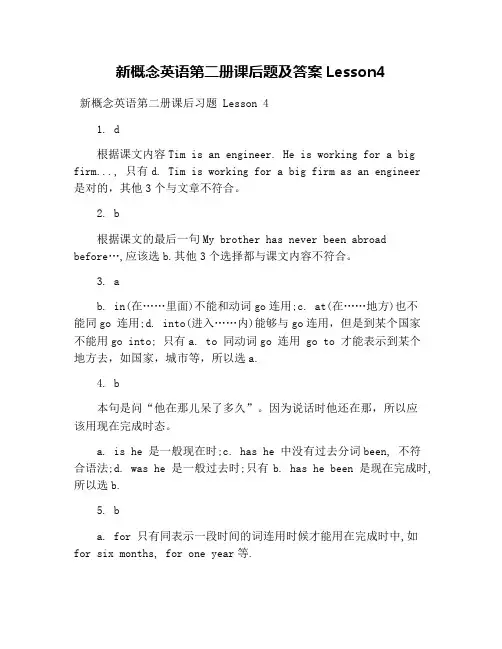
新概念英语第二册课后题及答案Lesson4新概念英语第二册课后习题 Lesson 41. d根据课文内容Tim is an engineer. He is working for a big firm..., 只有d. Tim is working for a big firm as an engineer 是对的,其他3个与文章不符合。
2. b根据课文的最后一句My brother has never been abroad before…,应该选b.其他3个选择都与课文内容不符合。
3. ab. in(在……里面)不能和动词go连用;c. at(在……地方)也不能同go 连用;d. into(进入……内)能够与go连用,但是到某个国家不能用go into; 只有a. to 同动词go 连用 go to 才能表示到某个地方去,如国家,城市等,所以选a.4. b本句是问“他在那儿呆了多久”。
因为说话时他还在那,所以应该用现在完成时态。
a. is he 是一般现在时;c. has he 中没有过去分词been, 不符合语法;d. was he 是一般过去时;只有b. has he been 是现在完成时, 所以选b.5. ba. for 只有同表示一段时间的词连用时候才能用在完成时中,如for six months, for one year等.c. from 常与介词to连用表示"从……到……",它很少用于现在完成时;d. by 能够表示时间“到……为止”,常用于过去完成时中和将来完成时中,但是它用在本句意思不对;只有b. since(从……以来)能够用在完成时态中,选 b.才能使句子的时态和意思准确并且合乎逻辑。
6. a本句的意思是“他刚刚买了一辆澳大利亚小汽车”强调买的时间短,用just来表示。
b. a long time ago(很久以前)与原来句子不符合。
c. last year(去年)也跟原来句子不符合。
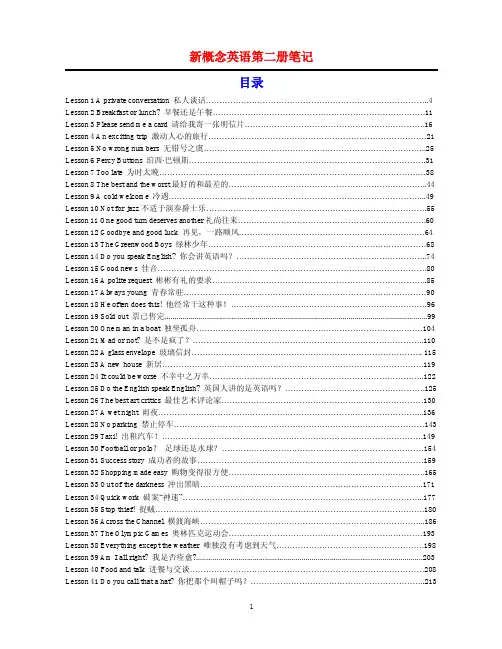
目录Lesson 1 A private conversation 私人谈话 (4)Lesson 2 Breakfast or lunch? 早餐还是午餐 (11)Lesson 3 Please send me a card 请给我寄一张明信片 (16)Lesson 4 An exciting trip 激动人心的旅行 (21)Lesson 5 No wrong numbers 无错号之虞 (25)Lesson 6 Percy Buttons 珀西.巴顿斯 (31)Lesson 7 Too late 为时太晚 (38)Lesson 8 The best and the worst最好的和最差的 (44)Lesson 9 A cold welcome 冷遇 (49)Lesson 10 Not for jazz不适于演奏爵士乐 (55)Lesson 11 One good turn deserves another礼尚往来 (60)Lesson 12 Goodbye and good luck 再见,一路顺风 (64)Lesson 13 The Greenwood Boys 绿林少年 (68)Lesson 14 Do you speak English? 你会讲英语吗? (74)Lesson 15 Good news 佳音 (80)Lesson 16 A polite request 彬彬有礼的要求 (85)Lesson 17 Always young 青春常驻 (90)Lesson 18 He often does this! 他经常干这种事! (96)Lesson 19 Sold out 票已售完 (99)Lesson 20 One man in a boat 独坐孤舟 (104)Lesson 21 Mad or not? 是不是疯了? (110)Lesson 22 A glass envelope 玻璃信封 (115)Lesson 23 A new house 新居 (119)Lesson 24 It could be worse 不幸中之万幸 (122)Lesson 25 Do the English speak English? 英国人讲的是英语吗? (125)Lesson 26 The best art critics 最佳艺术评论家 (130)Lesson 27 A wet night 雨夜 (136)Lesson 28 No parking 禁止停车 (143)Lesson 29 Taxi! 出租汽车! (149)Lesson 30 Football or polo?足球还是水球? (154)Lesson 31 Success story 成功者的故事 (159)Lesson 32 Shopping made easy 购物变得很方便 (165)Lesson 33 Out of the darkness 冲出黑暗 (171)Lesson 34 Quick work 破案“神速” (177)Lesson 35 Stop thief! 捉贼 (180)Lesson 36 Across the Channel 横渡海峡 (186)Lesson 37 The Olympic Games 奥林匹克运动会 (193)Lesson 38 Everything except the weather 唯独没有考虑到天气 (198)Lesson 39 Am I all right? 我是否痊愈? (203)Lesson 40 Food and talk 进餐与交谈 (208)Lesson 41 Do you call that a hat? 你把那个叫帽子吗? (213)Lesson 42 Not very musical 并非很懂音乐 (219)Lesson 43 Over the South Pole 飞越南极 (224)Lesson 44 Through the forest 穿过森林 (229)Lesson 45 A clear conscience 问心无愧 (234)Lesson 46 Expensive and uncomfortable 既昂贵又受罪 (238)Lesson 47 A thirsty ghost 嗜酒的鬼魂 (243)Lesson 48 Did you want to tell me something? 你想对我说什么吗? (247)Lesson 49 The end of a dream 美梦告终 (250)Lesson 50 Taken for a ride 乘车兜风 (256)Lesson 51 Reward for Virtue 对美德的奖赏 (262)Lesson 52 A pretty carpet 漂亮的地毯 (267)Lesson 53 Hot snake 触电的蛇 (272)Lesson 54 sticky fingers 粘糊的手指 (278)Lesson 55 Not a gold mine 并非金矿 (282)Lesson 56 Faster than sound! 比声音还快! (291)Lesson 57 Can I help you, madam? 您要买什么,夫人? (298)Lesson 58 A blessing in disguise? 是因祸得福吗? (305)Lesson 59 In or out? 进来还是出去? (311)Lesson 60 The future 卜算未来 (315)Lesson 61 Trouble with the Hubble 哈勃望远镜的困境 (318)Lesson 62 Affer the fire 大火之后 (323)Lesson 63 She was not amused 她并不觉得好笑 (329)Lesson 64 The Channel Tunnel 海峡隧道 (334)Lesson 65 Jumbo versus the police 小象对警察 (339)Lesson 66 Sweet as honey!像蜜一样甜! (344)Lesson 67 Volcanoes 火山 (349)Lesson 68 Persistent纠缠不休 (357)Lesson 69 But not murder!并非谋杀! (359)Lesson 70 Red for danger危险的红色 (362)Lesson 71 A famous clock 一个著名的大钟 (366)Lesson 72 A car called Bluebird“蓝鸟”汽车 (369)Lesson 73 The record-holder纪录保持者 (371)Lesson 74 Out of the limelight 舞台之外 (376)Lesson 75 SOS呼救信号 (380)Lesson 76 April Fools' Day愚人节 (386)Lesson 77 A successful operation 一例成功的手术 (388)Lesson 78 The last one? 最后一枝吗? (392)Lesson 79 By air 乘飞机 (397)Lesson 80 The Crystal Palace 水晶宫 (400)Lesson 81 Escape 脱逃 (403)Lesson 82 Monster or fish? 是妖还是鱼? (406)Lesson 83 After the elections 大选之后 (409)Lesson 84 On strike 罢工 (412)Lesson 85 Never too old to learn 活到老学到老 (415)Lesson 86 Out of control 失控 (419)Lesson 87 A perfect alibi 极好的不在犯罪现场的证据 (421)Lesson 88 Trapped in a mine困在矿井里 (423)Lesson 89 A slip of the tongue 口误 (426)Lesson 90 What's for supper? 晚餐吃什么? (429)Lesson 91 Three men in a basket 三人同篮 (434)Lesson 92 Asking for trouble 自找麻烦 (437)Lesson 93 A noble gift 崇高的礼物 (439)Lesson 94 Future champions 未来的冠军 (442)Lesson 95 A fantasy 纯属虚构 (445)Lesson 96 The dead return 亡灵返乡 (447)本文档仅用于学习交流之用,不得用于商业目的。
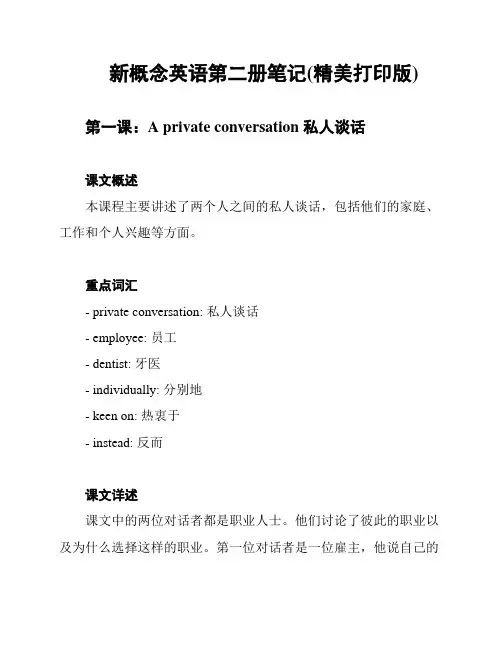
新概念英语第二册笔记(精美打印版)第一课:A private conversation 私人谈话课文概述本课程主要讲述了两个人之间的私人谈话,包括他们的家庭、工作和个人兴趣等方面。
重点词汇- private conversation: 私人谈话- employee: 员工- dentist: 牙医- individually: 分别地- keen on: 热衷于- instead: 反而课文详述课文中的两位对话者都是职业人士。
他们讨论了彼此的职业以及为什么选择这样的职业。
第一位对话者是一位雇主,他说自己的员工做事不利索,需要手把手地指导。
他所雇佣的人中,有一位牙医,这位牙医个人能力很强,但做事不守规矩。
第二位对话者是一位操控电视卫星的技术员,他对自己的工作很满意。
他认为这份工作能提供稳定的收入,而且他对这个技术很感兴趣。
相比之下,他并不喜欢在办公室工作。
他坚信个人的兴趣和爱好应该引导自己的职业选择,而不仅仅是为了赚钱。
在谈论个人爱好时,两位对话者发现他们都对音乐很感兴趣。
然而,他们的爱好有所不同。
第一位对话者表示,他喜欢个别的音乐会,而不是大型音乐会。
第二位对话者则喜欢大型音乐会,认为那种氛围和观众的热情是独一无二的。
课后练1. 为什么第一位对话者对自己的员工感到不满意?2. 第二位对话者为什么喜欢做电视卫星的技术员?3. 两位对话者的音乐兴趣有何不同?参考答案1. 第一位对话者对自己员工感到不满意是因为他们做事情不利索,需要手把手地指导。
2. 第二位对话者喜欢做电视卫星的技术员是因为这份工作能提供稳定的收入,而且他对这个技术很感兴趣。
3. 两位对话者的音乐兴趣不同。
第一位对话者喜欢个别的音乐会,而第二位对话者喜欢大型音乐会。
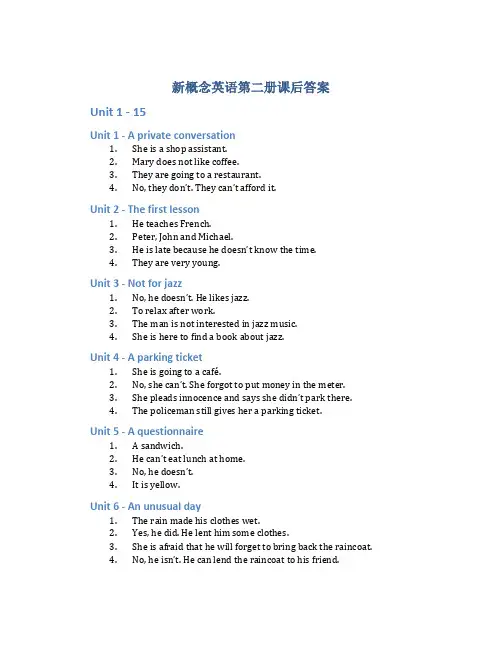
新概念英语第二册课后答案Unit 1 - 15Unit 1 - A private conversation1.She is a shop assistant.2.Mary does not like coffee.3.They are going to a restaurant.4.No, they don’t. They can’t afford it.Unit 2 - The first lesson1.He teaches French.2.Peter, John and Michael.3.He is late because he doesn’t know the time.4.They are very young.Unit 3 - Not for jazz1.No, he doesn’t. He likes jazz.2.To relax after work.3.The man is not interested in jazz music.4.She is here to find a book about jazz.Unit 4 - A parking ticket1.She is going to a café.2.No, she can’t. She forgot to put money in the meter.3.She pleads innocence and says she didn’t park there.4.The policeman still gives her a parking ticket.Unit 5 - A questionnaire1. A sandwich.2.He can’t eat lunch at home.3.No, he doesn’t.4.It is yellow.Unit 6 - An unusual day1.The rain made his clothes wet.2.Yes, he did. He lent him some clothes.3.She is afraid that he will forget to bring back the raincoat.4.No, he isn’t. He can lend the raincoat to his friend.Unit 7 - Is that you, John?1.He d oesn’t think it is John’s voice.2.He has lost his wallet on the train.3.No, he didn’t. He found £20.4.He should return the money.Unit 8 - A coffee break1.No, she doesn’t drink coffee.2.She wants to buy some milk.3.No, he doesn’t. He is going to buy some lemon t ea.4.The tea costs £1.80.Unit 9 - A matter of seconds1.In a library.2.She asked the man to return the book to the library.3.No, she doesn’t have enough money to pay the fine.4.She gets a letter from the library.Unit 10 - When were you born?1.He was born on May 5th, 1965.2.His father was born in 1935.3.Yes, he does. He is a schoolteacher.4.He is very tired.Unit 11 - The best and the worst1.In Rome and Paris.2.Rome was the most interesting place he visited.3.The weather in India was the worst.4.He doesn’t know. He hasn’t been to Switzerland. Unit 12 - New Zealand1.It is a small country in the South Pacific.2.There are three main islands.3.The capital city is Wellington.4.The people there are friendly.Unit 13 - Work and play1.He is a teacher.2.Teacher to students.3.He can’t stay with his friends because he has to work.4.He can’t. He has work to do.Unit 14 - A museum for everyone1.Yes, it does.2.They can touch everything in the museum.3.Yes, they have. They enjoyed their visit very much.4.They don’t have to pay any money.Unit 15 - Paying the bill1.They had lunch at a restaurant.2.They pay first and then have lunch.3.They forget to bring any money.4.They invite the man to have some coffee.ConclusionThe above answers are provided for the exercises in the New Concept English Book 2. Go through the questions and compare your answers with the suggested responses to check for correctness. Practicing and reviewing these exercises will help enhance your understanding of the course material and improve your English language skills.。
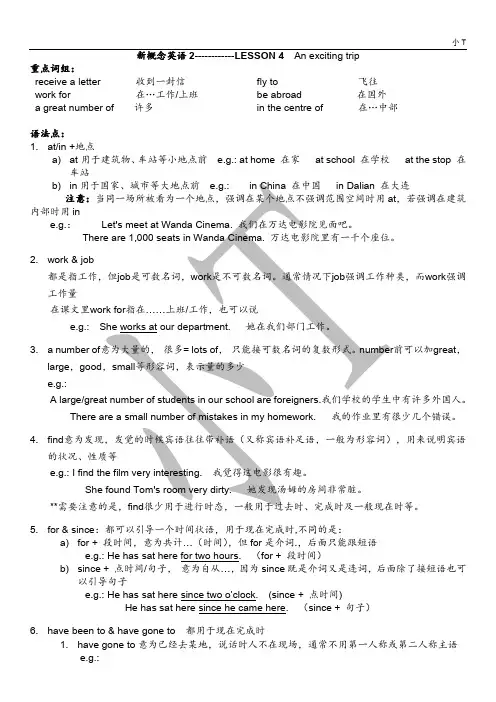
小T 新概念英语2------------LESSON 4 An exciting trip重点词组:receive a letter 收到一封信work for 在…工作/上班a great number of 许多fly to 飞往be abroad 在国外in the centre of 在…中部语法点:1. at/in +地点a) at用于建筑物、车站等小地点前 e.g.: at home 在家at school 在学校at the stop 在车站b) in用于国家、城市等大地点前 e.g.: in China 在中国in Dalian 在大连注意:当同一场所被看为一个地点,强调在某个地点不强调范围空间时用at,若强调在建筑内部时用ine.g.:Let's meet at Wanda Cinema. 我们在万达电影院见面吧。
There are 1,000 seats in Wanda Cinema. 万达电影院里有一千个座位。
2. work & job都是指工作,但job是可数名词,work是不可数名词。
通常情况下job强调工作种类,而work强调工作量在课文里work for指在……上班/工作,也可以说e.g.: She works at our department. 她在我们部门工作。
3. a number of意为大量的,很多= lots of,只能接可数名词的复数形式。
number前可以加great,large,good,small等形容词,表示量的多少e.g.:A large/great number of students in our school are foreigners.我们学校的学生中有许多外国人。
There are a small number of mistakes in my homework. 我的作业里有很少几个错误。
4. find意为发现,发觉的时候宾语往往带补语(又称宾语补足语,一般为形容词),用来说明宾语的状况、性质等e.g.: I find the film very interesting. 我觉得这电影很有趣。
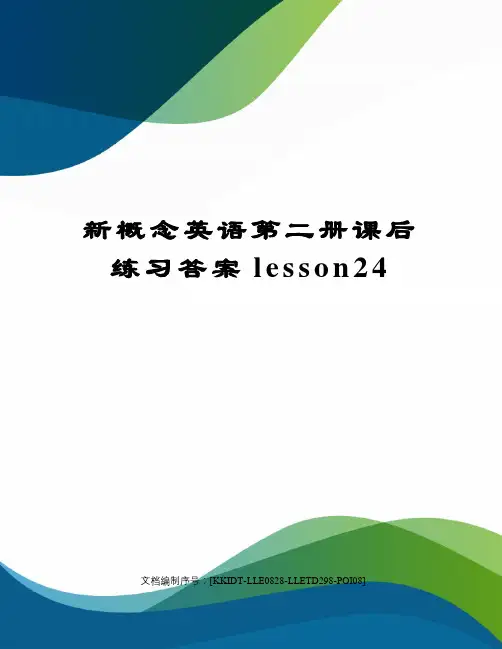
新概念英语第二册课后练习答案l e s s o n24文档编制序号:[KKIDT-LLE0828-LLETD298-POI08]新概念英语第二册课后习题答案详解Lesson 24 练习答案 Key to written exercises1.难点练习答案A 1 received 2 on the 3 On the4 believes5 of6 salary7 lend 8 asked for 9 Apart from10 an irritable 11 are 12 pay attention to13 Remember 14 suit 15 grow up16 beside 17 It's…exciting 18 understand19 home 20 There isB 1 What a wonderful garden(this is)!2 What a lot of trouble he is causing!3 What a tall building (it is)!4 What a clever girl you are!C 1 He handed the prize to me.2 The waiter brought the man a bottle of beer.3 I've ordered you some soup.4 Bring me that book please!5 She promised the finder a reward.D 1 haven't any/have no money.2 I didn't go anywhere/went nowhere in the holidays.3 There wasn't anybody/was nobody present when the accident happened.E 1 It's George's.2 It's that woman's.3 I like Keats' poetry best.4 They're the children's.5 They're the soldiers'.F 1 off 2 back 3 up 4 over 5 on 6 awayG 1 I put my hat on.2 I took my coat off.3 He put the fire out.4 They cut the king's head off.2.多项选择题答案1. b根据课文第2-3行‘I left the money in my room,’ I said, ‘and it’s not there now’, 只有b. someone had stolen his money 符合作者的推测。
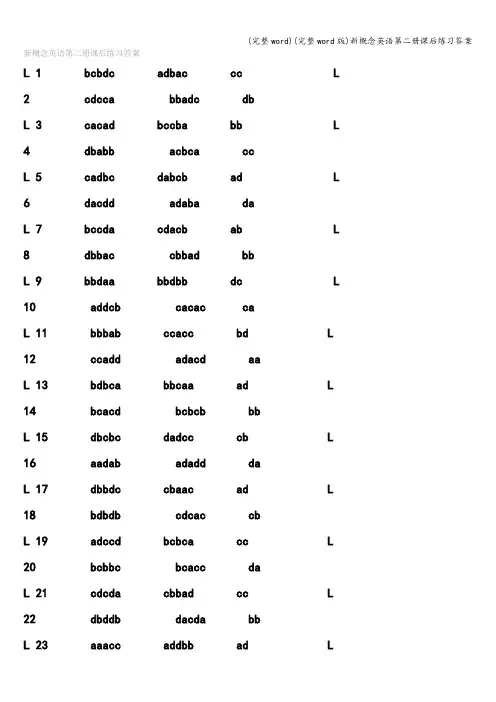
新概念英语第二册课后练习答案L 1 bcbdc adbac cc L 2 cdcca bbadc dbL 3 cacad bccba bb L 4 dbabb acbca ccL 5 cadbc dabcb ad L 6 dacdd adaba daL 7 bccda cdacb ab L 8 dbbac cbbad bbL 9 bbdaa bbdbb dc L 10 addcb cacac caL 11 bbbab ccacc bd L 12 ccadd adacd aaL 13 bdbca bbcaa ad L 14 bcacd bcbcb bbL 15 dbcbc dadcc cb L 16 aadab adadd daL 17 dbbdc cbaac ad L 18 bdbdb cdcac cbL 19 adccd bcbca cc L 20 bcbbc bcacc daL 21 cdcda cbbad cc L 22 dbddb dacda bbL 23 aaacc addbb ad L24 baaca acccb abL 25 cbbab cdbaa da L26 adcba ddabd bdL 27 dcddd baddc cc L28 cdbbc dbdcd baL 29 bccbd babbb cc L30 aadab cccda ddL 31 dbaca adabc ac L32 cccbb cadad bcL33 dbdac bbccc ac L34 dabca dcbcb caL35 adadd adaba dd L36 addcd ccbad ccL37 cbbbb dacda ba L38 bcaac bddba ddL39 dacdd abacc ab L40 ccbca acbbb bdL41 aacdc bbada cb L42 dddbb cddac daL43 bbaad daccd ac L44 cbccc bdaba bdL45 bdabb dcbcb db L46 acddaL47 dabad aaddc ac L48 cbcba cbbda bcL49 dabab ccacc aa L50 bdacc aadbb cdL51 bcddd adcad db L52 bccab dcbac bdL53 cdacc cdcda cc L54 dbdbd badcb ddL55 aabda acabd ab L56 cacca cabbc ccL57 abbbb dcdcb da L58 bdaac bdcad bdL59 dbddd abada ab L60 bacbc babac adL61 bacca dcabb dd L62 addcd ccbda dbL63 dbaab ddacd ca L64 ccccb bccab bbL65 adbbc aadcc bd L66 cbaad aabdb baL67 daddd dbbad dd L68 bbcdb bbccc aaL69 abcbb ddaab cd L70 dbccdL71 bdbbc cdbbb ba L72 acadb accdb adL73 cadac dadaa db L74 bdccd cacbc abL75 cabdb abbdd cc L76 dbdaa bbacb ddL77 acabc dddaa ba L78 acbbc acbab caL79 bdcca dbadb ac L80 cbdad cadcc dbL81 daadb bdcbd bd L82 abadc cdaac bdL83 bacca bcbcd ab L84 ccabd cccda cdL85 ddbab abdbb dc L86 bcabb bdcab bcL87 cdcda ccada ad L88 cbbcc abbcc cbL89 aadad dadbd db L90 bccca bcbad ddL91 dbcbc dbbcb cb L92 bcdcb abbad caL93 cdbac dbbcb cb L94 abcbaL95 dabad cdcac dc L96 dccba dcdab cb。
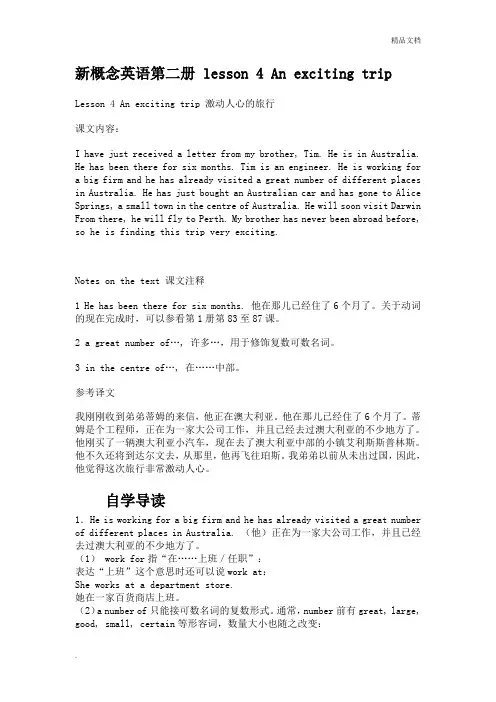
新概念英语第二册 lesson 4 An exciting trip Lesson 4 An exciting trip 激动人心的旅行课文内容:I have just received a letter from my brother, Tim. He is in Australia. He has been there for six months. Tim is an engineer. He is working for a big firm and he has already visited a great number of different places in Australia. He has just bought an Australian car and has gone to Alice Springs, a small town in the centre of Australia. He will soon visit Darwin From there, he will fly to Perth. My brother has never been abroad before, so he is finding this trip very exciting.Notes on the text 课文注释1 He has been there for six months. 他在那儿已经住了6个月了。
关于动词的现在完成时,可以参看第1册第83至87课。
2 a great number of…, 许多…,用于修饰复数可数名词。
3 in the centre of…, 在……中部。
参考译文我刚刚收到弟弟蒂姆的来信,他正在澳大利亚。
他在那儿已经住了6个月了。
蒂姆是个工程师,正在为一家大公司工作,并且已经去过澳大利亚的不少地方了。
他刚买了一辆澳大利亚小汽车,现在去了澳大利亚中部的小镇艾利斯斯普林斯。
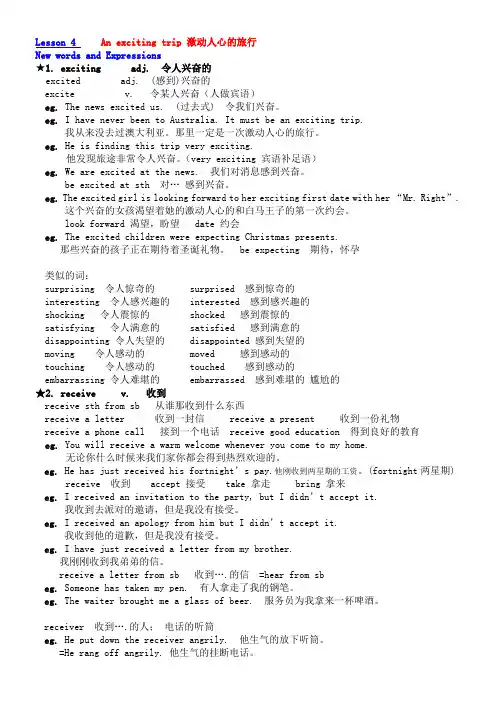
Lesson 4 An exciting trip 激动人心的旅行New words and Expressions★1. exciting adj. 令人兴奋的excited adj. (感到)兴奋的excite v. 令某人兴奋(人做宾语)eg. The news excited us. (过去式) 令我们兴奋。
eg. I have never been to Australia. It must be an exciting trip.我从来没去过澳大利亚。
那里一定是一次激动人心的旅行。
eg. He is finding this trip very exciting.他发现旅途非常令人兴奋。
(very exciting 宾语补足语)eg. We are excited at the news. 我们对消息感到兴奋。
be excited at sth 对…感到兴奋。
eg.The excited girl is looking forward to her exciting first date with her “Mr. Right”.这个兴奋的女孩渴望着她的激动人心的和白马王子的第一次约会。
look forward 渴望,盼望 date 约会eg. The excited children were expecting Christmas presents.那些兴奋的孩子正在期待着圣诞礼物。
be expecting 期待,怀孕类似的词:surprising 令人惊奇的 surprised 感到惊奇的interesting 令人感兴趣的 interested 感到感兴趣的shocking 令人震惊的 shocked 感到震惊的satisfying 令人满意的 satisfied 感到满意的disappointing 令人失望的 disappointed 感到失望的moving 令人感动的 moved 感到感动的touching 令人感动的 touched 感到感动的embarrassing 令人难堪的 embarrassed 感到难堪的尴尬的★2. receive v. 收到receive sth from sb 从谁那收到什么东西receive a letter 收到一封信 receive a present 收到一份礼物receive a phone call 接到一个电话 receive good education 得到良好的教育eg. You will receive a warm welcome whenever you come to my home.无论你什么时候来我们家你都会得到热烈欢迎的。
新概念英语第二册 lesson 4 An exciting trip Lesson 4 An exciting trip 激动人心的旅行课文内容:I have just received a letter from my brother, Tim. He is in Australia. He has been there for six months. Tim is an engineer. He is working for a big firm and he has already visited a great number of different places in Australia. He has just bought an Australian car and has gone to Alice Springs, a small town in the centre of Australia. He will soon visit Darwin From there, he will fly to Perth. My brother has never been abroad before, so he is finding this trip very exciting.Notes on the text 课文注释1 He has been there for six months. 他在那儿已经住了6个月了。
关于动词的现在完成时,可以参看第1册第83至87课。
2 a great number of…, 许多…,用于修饰复数可数名词。
3 in the centre of…, 在……中部。
参考译文我刚刚收到弟弟蒂姆的来信,他正在澳大利亚。
他在那儿已经住了6个月了。
蒂姆是个工程师,正在为一家大公司工作,并且已经去过澳大利亚的不少地方了。
他刚买了一辆澳大利亚小汽车,现在去了澳大利亚中部的小镇艾利斯斯普林斯。
新东方新概念英语第二册课后习题答案详解/html/2/xiangjie/list_81_2.html第13课、新东方新概念英语第二册课后习题答案详解Lesson 131. b根据课文第3-4行They will be coming…and most of the young people in town will…,只有b. mainly the young people 与课文内容相符合,而其他3个选择都不符合课文内容。
2. d根据文章第7-8行...the police will have a difficult time, they will be trying to keep order.只有d. to prevent trouble(防止麻烦)最符合文章的意思,它说明警察去那的目的,而其它3个选择都表示原因,不能准确表达文章的含义。
3. b需要选同前面句子中的most of (大多数)意思相近的词或短语。
a. A lot(许多)后面应该有of, 与most of 意思不同;c. Some(一些)不是most of 的同义词,语法上也讲不通;d. Many(许多)也不是most of 的同义词,且有语法错误;只有b. Nearly all(几乎所有的)同most of 的意思最接近,也最符合语法。
4. c只有 c. long will they be 最符合语法和题目意思。
a. long they will be 不是疑问句形式,不合乎语法规则;b. they will be 不合乎语法,也不合乎题目意思;d. long they be 不合乎语法。
5. a只有a.in才最接近前面句子中的 during 的含义,而其他3个选择都在意思上讲不通。
6. b只有b. as usual(通常)才能使这个句子意思完整,语法正确,而其他3个选择都不符合习惯用法和语法。
7. b这个句子的主语police(警察)是表示复数意义的名词,因此它后面的谓语动词应该是复数形式的。
新概念英语第二册课后习题答案详解Lesson 11. b选b最为正确。
因为a.d.都与课文内容不符合,也不合乎逻辑;c.的意思是“他们没有注意他”,而作者的意图并不是想让他们注意他,而是想让他们停止谈话。
所以选b. 最能表达作者当时心里的感受。
2.c其余3个答案都与原句意思不符合。
3.b因为a. to 不对,可以是He went to the theatre;c. into 也不对,可以是He went into the theatre;d. on更不符合语法,表示在某一个地方用介词in 或at, in 表示在大的空间,如国家,城市等,at 则表示在小的地点或空间,如atthe office, at the theatre 等, 所以选b.是正确的。
4.db. above(在……上方);c. ahead of (在……的前面,在……之前)不和behind 对应,也不强调位置的前后顺序。
a. before 和 d. infront of 都是和behind对应的,都有“在……前面”的意思。
但in front of 更具体的强调位置,而before则包含更宽泛的意思,即时间上,空间,次序,登记,重要性方面的“在……前面”5.c因为用a. Where, b. why, d. when 提问都不符合逻辑,都不是针对状态提问的,只有How提问,才能用Angry回答。
6.ab. they 只做主语; c. their只能做定语;d. us 虽然可以做宾语,但与前一句意思不符合。
7.da. none是代词,很少用在名词前面;b. any 只能用在否定句或疑问句中;c. not any 不符合语法,因为前面没有助动词did.8.ba. chair(椅子),c. armchair(手扶椅) d. class(班级) 这3个选择都和seat的意思不符合。
Seat是”座位,座席”的意思。
强调的是可供坐下的地方,不是具体的椅子。
☆Lesson 4 An exciting trip 激动人心的旅行Lesson 5 No wrong numbers 无错号之虞3 Mr.Scott has a garage. The garage is .A.to himB.of himC.of hisD.his4 Mr.Scott cannot get a telephone for his garage. he has just bought twelve pigeons.A.That's soB.That's whyC.BecauseD.For5 He has just bought twelve pigeons. When did hethem?A.boughtB.buysC.buyD.buying6 What's the distance from Pinhurst to Silbury? Howis Pinhurst Silbury?A.long ago ... untilB.long ... awayC.away ... tillD.far ... from7 The pigeon flew from one garage to the other three minutes.A.inB.intoC.withD.on8 Mr.Scott has a garage in Silbury. Hisgarage is in Pinhurst.A.anotherB.otherC.elseD.different9 Mr.Scott can't get a telephone. Telephones are hard to .A.takeB.receiveC.obtainD.find10 He has sent requests for spare parts. He hasspare parts.A.askedB.asked forC.beggedD.pleased11 Urgent messages are important, so they must be sent .A.quicklyB.slowlyC.by handrgely12 Mr.Scott's ‘telephone service' is private. It is .A.generalB.spareC.secretD.his ownLesson 6 Percy buttons 珀西·巴顿斯3 The writer has just moved to a new house. She was yesterday.A.at houseB.to the houseC.at homeD.in the home4 She gave .A.to him a mealB.a meal for himC.him to a mealD.a meal to him5 A neighbor told me about him. He Percy Buttons was a beggar.A.toldB.said meC.told to meD.said6 Everybody knows him. know him.A.They allB.EachC.EveryD.All they7does he call? Once a month.A.How seldomB.How longC.How soonD.How often8 A beggar is a person who .A.asks for money but doesn't workB.asks for foodC.works hardD.is out of work9 You can have a meal .A.only in the morningB.at any timeC.only at middayD.only in the evening10 She gave him a piece of cheese. He put the of cheese in his pocket.A.bitB.barC.blockD.packet11 He calls at every house in the street. He everyone.A.shouts atB.callsC.cries out atD.visits12 All the houses in ourare the same age and size.A.streetB.wayC.roadD.routeLesson 7 Too late为时太晚3were detectives waiting? At the airport.A.WhyB.WhenC.WhereD.What4were they expecting? A valuable parcel of diamonds.A.WhyB.WhenC.WhereD.What5 Someone had told the police that thieves would try to steal the diamonds. This happenedthe plane arrived.A.beforeB.afterC.whenD.as soon as6 The detectives went into the building and waited.A.inB.intoC.insideD.for7 Two men took the parcel, off the plane. They.A.took off itB.it took offC.took offD.took it off8 The detectives werea valuable parcel of diamonds.A.expectingB.waitingC.expecting forD.expecting to9 The parcel was valuable. It was.A.worthB.worthyC.preciousD.value10 The thieves wanted tothe diamonds.A.robB.stealC.take fromD.take to11 The detectives waited inside the main building. This was thebuilding.A.most importantB.smallestC.firstD.greatest12 Someone had filled the parcel with stones and sand. It wasstones and sand.A.full withB.full ofC.full byD.full inLesson 8 The best and the worst 最好的和最差的3 Bill Frith's garden is larger than Joe's. It isrger gardenB.a large gardenrge gardenrgest garden4 Bill is a hard worker. He worksthan Joe.A.harderB.more hardC.more hardlyD.hardier5 Joe's garden is more interesting Bill's.A.byB.forC.thanD.from6 The writer is fond of gardens.A.They like himB.They like to himC.He likes themD.He likes7 Joe's garden is the best in the town. It's the best them all.A.inB.ofC.forD.by8 Joe wins every time. He always Bill Frith.A.winsB.beatsC.gainsD.earns9 Joe grows more flowers. More flowers in his garden.A.growB.grow tallC.grow upD.grow big10 Joe's garden is interesting. Joe isin gardening.A.interestingB.interestC.interestinglyD.interested11 The writer doesn't like hard work. It's to look after a garden.A.a hard workB.a hard jobC.hard jobD.hardly a job12 Every year the writer enters for the garden competitionA.veryB.alsoC.andD.either Lesson 9A cold welcome 冷遇3 They went to the Town Hall on Wednesday evening. They went .A.the eveningB.on the eveningC.eveningD.in the evening4 The people under the Town Hall clock.A.wereB.wasC.isD.be5 will it strike? In twenty minutes'time.A.WhenB.How longC.How long agoD.How much6 What time did it stop? five to twelve.A.OnB.AtC.InD.During7 Did happen? No, nothing happened.A.nothingB.anythingC.anyD.a thing8 How many times did the clock .A.hitB.beatC.knockD.strike9 It was fifteen minutes eleven.A.passB.pastC.passedD.pasted10 A clock usually has two hands, a minute hand and hand.A.a secondB.an hourC.a timeD.a big11 Most people wear or carry .A.an alarm clockB.an alarmC.a clockD.a watch12 It refused to welcome the New Year. It .A.denied itB.wanted toC.didn't want toD.wished toLesson 10 Not for jazz 不适于演奏爵士乐3 Our clavichord is kept in the living room. That's where we it.A.keptB.have keptC.are keepingD.keep4 It has belonged to our family for years. It's the.A.familiesB.families'C.family'sD.familys'5 The family have had the clavichord many years.A.sinceB.forC.fromD.by6 Whoit? Grandfather did.A.buyB.was boughtC.boughtD.did buy7 We are not allowed to touch it.We ______ touch it.a.mustn'tb.mustn't toc.haven't tod.don't have to8 What's it ? A clavichord.A.toldB.saidC.calledD.spoken9 It's kept in the living room.That's where we ______ it.a.haveb.holdc.liftd.carry10 The visitor damaged it.She ______ it.a.hurtb.painedc.broked.destroyed11 Recently it was damaged. She damaged it .testlytelyD.finally12 A friend of my father's is the clavichord.A.mendingB.makingC.doingD.building☆Lesson 11 One good deserves another 礼尚往来Lesson 12 Goodbye and good luck 再见,一路顺风9 It has sailed across the Atlantic many times.It has sailed across the Atlantic ______ .A.sometimesB.alwaysC.oftenually☆Lesson 13 The Greenwood Boys 绿林少年Lesson 14 Do you speak English? 你会讲英语吗?Structure句型3 What kind of car did he ______ ?a.drive b.drovec.driven d.driving4 As soon as he had got into the car, I said good morning. I said good morning______ he had got into the car. a.before b.a long time afterc.just after d.a moment before5‘Good morning,’I ______ .a.spoke b.talkedc.told d.said6 I speak a few words of French. I don't know ______ French.a.many b.muchc.plenty of d.a little7 Neither of us spoke. We ______ .a.neither spoke b.either spokec.both didn't speak d.neither didn't speakVocabulary词汇8 On the way, a young man waved to me. This happened ______ .a.before the writer's journeyb.during the writer's journeyc.after the writer's journeyd.a long time ago9 The young man waved to the writer. He ______ him.a.saluted b.greetedc.signalled to d.nodded10 He asked for a lift. He was a ______.a.tramp b.hitch hikerc.passenger d.foreigner11 He replied in French. He ______ the writer in French.a.responded b.answeredc.returned d.remarked12 The writer had ______ reached the town when the young man spoke.a.often b.almostc.sometimes d.just asLesson 15 Good news 佳音Structure 句型3‘Mr. Harmsworth ______ see you, ’the secretary said.a.would b.shallc.will d.could4 ______ did he feel? Very nervous.a.What b.Howc.How much d.Which5 The firm couldn't pay ______ large salaries.a.so b.such ac.such d.a such6 ______ turn is it? It's your turn.a.Which b.To whomc.Whom d.Whose7‘Mr. Harmsworth, ’I said ______ a weak voice.a.in b.withc.on d.underVocabulary 词汇8 Mr. Harmsworth wanted to see me. He wanted to ______ me.a.watch b.look atc.look for d.speak to9 I felt nervous because I felt ______ .a.angry b.crossc.anxious d.ill10 It's your turn. ______ .a.It's your line b.It's your rowc.You're next d.It's your chance11 Don't interrupt!Don't ______ .a.speak b.talkc.talk while I'm talking d.cut off12 The writer would receive an extra £1, 000 a year. He would get£1, 000 a year______ .a.less b.morec.over d.upLesson 16 A polite request 彬彬有礼的要求Structure 句型3 If you park your car in the right place you ______ receive a ticket. a.will b.wouldn'tc.didn't d.won't4 Traffic police never let you ______ without a ticket.a.go b.to goc.going d.have gone5 We welcome you to our city. You ______ to our city.a.welcome b.are welcomec.have welcomed d.are welcoming6‘No Parking’means ______ .a.don't leave your car hereb.without parkingc.don't stopd.there's no room to park here7 This note is only a reminder. It's ______ .a.nothing b.no onec.nothing extra d.nothing moreVocabulary 词汇8 This is a‘No Parking’area. Cars aren't allowed in this ______ . a.district b.countryc.surrounding d.kingdom9 You will enjoy your stay. It will ______ you.a.amuse b.enjoyc.laugh at d.please10 You will enjoy your stay. How long will you ______ here?a.rest b.preventc.sit d.remain11 This note is only a reminder. It will help ______ .a.you remind b.your souvenirc.your remembrance d.you to remember12 You cannot fail to obey it. You can't ______ to do this.a.refuse b.denyc.resist d.withdrawLesson 17 Always young青春常驻Structure 句型3 She must be at least thirty-five years old. In my opinion she ______ .a.hasb.isc.cand.must4 ______is she?At least thirty-five years old.A.HowB.How bigC.How muchD.How old5 she must appear in a bright red dress.She will be dressed ______ red.A.withB.onC.inD.by6 she must appear in a bright red dress.That's what she ______ .A.has doneB.have to doC.has to doD.had done7 She had to wear short socks. It was ______ for her to wear them.a.certainb.necessaryc.importantd.impossibleVocabulary 词汇8 She often appears as a young girl. She ______ on the stage as a young girl.a.is presentedb.pointsc.showd.seems9 We went to the theatre to see a ______ .A.playB.gameC.toyD.match10 Jennifer will take part in the play.She______ it.a. will writeb. won't be inc. will be ind. will produce11 Men usually wear ______ .a.socks instead of stockingsb.stockings instead of socksc.either socks or stockingsd.neither socks nor stockings12 She is grown up. She is ______ .a.very oldb.an adolescentc.a teenaged.an adultLesson 18 He often does this! 他经常干这种事!Structure 句型3 After I had lunch . . . After I had ______ it . . .a.paid for b.eaten c.kept d.bought4 She couldn't find her bag. It wasn't ______ .a.their b.theirs c.they're d.there5 ______I was looking for it, the landlord came in.a.Because b.While c.But d.Even if6 I haven't got a bag. I don't ______ one.a.get b.buy c.own d.owe7 My dog had taken it into the garden. It was ______ the garden.a.to b.Into c.at d.inVocabulary 词汇8 Ilooked for my bag. I ______ it.a.tried to look after b.tried to look at c.tried to find d.let 9 I had left it on the chair. That's where I ______ it.a.put b.Let c.allowed d.permitted10 The chair was beside the door. It was ______ it.a.near b.far from c.next to d.besides11 The landlord returned with my bag. He ______ quickly.a.turned b.turned back c.came back d.turned round 12 He gave it back to me. He ______ to me.a.turned it b.returned it c.turned it back d.turned it round Lesson 19 Sold out 票已售完Structure句型3 The play may begin at any moment. It ______ .a.has begunb.won't begin for a long timec.hasn't begun yetd.began a long time ago4 May I have two tickets please? ______ two tickets please?a.You must give meb.You have got to give mec.Could I haved.You may give me5 May I have two tickets? Please let me ______ two tickets.a.having b.to have c.had d.have6 The performance ______ next Wednesday.a.was b.will be c.shall be d.has been7 I might as well have them. I am ______ to have them.a.very pleased b.very gladc.not very glad d.delightedVocabulary词汇8 I hurried to the ticket office. I ______ .a.went there b.went there quicklyc.went there slowly d.didn't go there9 ‘What a pity!’ Susan exclaimed. Susan was ______ .a.pleased b.glad c.sorry d.amused10 Can I return these tickets? I want to ______ .a.give them back b.give them inc.give them up d.give them off11 ‘Certainly, ’ the girl said. ‘ ______ ’ the girl said.a.Off course b.Course c.Of course d.Surely not12 Do you still want them? Do you want them ______ ?a.yet b.even c.now d.moreLesson20 One man in a boat 独坐孤舟Structure句型3 ______ is your favourite sport?Fishing.A.WhoB.WhichC.WhomD.Whose4 He doesn't catch anything.He never catches________.A.nothingB.anythingC.somethingD.everything5 I am even less lucky.I am_____ lucky.A.moreB.asC.not soD.so6 His bag is empty.He has______.A.a empty bagB.an empty bagC.empty bagD.one empty bag7 I an only interested in doing nothing.That's_____I'm interested in.A.onlyB.the oneC.allD.the onlyVocabulary词汇8 Fishing is my favourite sport.It is_______A.the one I like bestB.preferC.my bestD.the best9 A fisherman usually _____ fish .A.buysB.sellsC.tries to catchD.keeps10 He never_____any fish.A.holdsB.takes hold ofC.catchesD.takes11 He always goes ______with an empty bag.A.to homeB.to houseC.to the houseD.home12 You must give up fishing .You must_____.A.stopB.beginC.surrenderD.end☆Lesson21 Mad or not?是不是疯了?Structure句型3 Passing planes can be heard night and day.You ______ them all the time.A.can headB.can to hearC.can hearD.can be heard4 It couldn’t be used then.It wasn’t ______ to use it.A.ableB.I'm sureC.impossibleD.possible5 Over a hundred people must have been driven away.()they were.A.I thinkB.I'm sureC.CertainD.Of course6 I am one of the few people left. So there().A.are none leftB.is one leftC.are some leftD.are a lot left7 How much()? A large sum of money.A.you have been offeredB.have you been offeredC.you have offereD.D.they offered youVocabulary词汇8 I have been offered some money. They want to()me some money.A.serveB.giveC.takeD.make9 I have been offered a large()of money.A.amountB.numberC.someD.piece10 I am determined to stay here. I()stay here.A.am will toB.want toC.mayD.am going to11 Everyone says I must be mad and they are probably right.()they are.A.Of courseB.It's certainC.PerhapsD.It's sure12 Everyone says I must be mad and that is probably().A.justB.fairC.correctD.equal☆Lesson 22 A glass envelope 玻璃信封Structure句型3 Jane never dreamed()a letter.A. to receiveB. receivingC. of receiveD. that she would receive4 She received a letter from a girl of her own age. The girl is()she is.A.the same age withB.the same ageC.as oldD.the same age as5 Did she the bottle into the sea? ()A.threwB.throwC.thrownD.throwing6 She never thought()it again.A.forB.toC.atD.about7 The girls write()regularly now.A.to one anotherB.the one to the otherC.each to otherD.to otherVocabulary词汇8 We were travelling across the Channel. We went on a()across the Channel.A.sailB.travelC.tripD.run9 Jane wrote her name and address on a()of paper.A.lumpB.barC.tubeD.sheet10 Both girls often write to each other now. They write().A.frequentlyB.occasionallyC.sometimesD.hurriedly11 You can buy()at the post office.A.sweetsB.stampsC.applesD.now and again12 They will travel faster. They will travel().A.soonerB.more quicklyC.hurriedlyD.shorter☆Lesson23 A new house 新居11 Work on it had begun before my sister left. My sister left()it begun.A.afterB.withoutC.behindD.soon12 It is a very modem house. It was built().stlytetestD.recently☆Lesson24 Ifcould be worse 不幸中之万幸Structure 句型3 The money ______ in his room.a.was b.were c.are d.has4 He could do nothing. He couldn't do ______ .a.something b.nothingc.anything d.everything5 A knock at the door ______ him.a.interrupted b.was interruptedc.interrupting d.was interrupting6 Where did she find the money? ______ the room.a.Outside b.Out of c.Out d.Without7 ______ room was it? This gentleman's.a.To whom b.Who c.Whose d.Of whomVocabulary 词汇8 The writer had lost his money. He felt upset. He must have been ______ .a.sick b.ill c.worried d.tired9 The manager was sympathetic ______ .a.Everyone liked him b.He liked everyonec.He was sorry for the writer d.He liked the writer10 He lost his money. His money was ______ .a.losing b.missing c.going away d.disappearing11 You can't post this letter without ______ .a.an envelope b.a packet c.some string d.a pen12 The girl returned the money. She was very ______ .a.honourable b.honest c.honoured d.trusting。
Lesson 4 An exciting trip 激动人心的旅行I have just received a letter from my brother, Tim. He is in Australia. He has been there for six months. Tim is an engineer. He is working for a big firm and he has already visited a great number of different places in Australia. He has just bought an Australian car and has gone to Alice springs, a small town in the centre of Australia. He will soon visit Darwin. From there, he will fly to Perth. My brother has never been abroad before, so he is fending this trip very exciting.我刚刚收到弟弟的来信,提姆。
他在澳大利亚。
他有六个月了。
提姆是一个工程师。
他是一家大公司工作,他已经访问了许多不同的地方在澳大利亚。
他刚买了一辆汽车和澳大利亚已经向爱丽丝斯普林斯,一个小镇的中心,澳大利亚。
他将很快访问达尔文。
从那里,他再飞往珀斯。
我兄弟从来没有出过国,因此他觉得这次旅行非常激动。
Notes on the text 课文注释1 He has been there for six months. 他在那儿已经住了6个月了。
关于动词的现在完成时。
2 a great number of…, 许多…,用于修饰复数可数名词。
3 in the centre of…, 在……中部。
新概念英语第二册 lesson 4 An exciting trip Lesson 4 An exciting trip 激动人心的旅行课文内容:I have just received a letter from my brother, Tim. He is in Australia. He has been there for six months. Tim is an engineer. He is working for a big firm and he has already visited a great number of different places in Australia. He has just bought an Australian car and has gone to Alice Springs, a small town in the centre of Australia. He will soon visit Darwin From there, he will fly to Perth. My brother has never been abroad before, so he is finding this trip very exciting.Notes on the text 课文注释1 He has been there for six months. 他在那儿已经住了6个月了。
关于动词的现在完成时,可以参看第1册第83至87课。
2 a great number of…, 许多…,用于修饰复数可数名词。
3 in the centre of…, 在……中部。
参考译文我刚刚收到弟弟蒂姆的来信,他正在澳大利亚。
他在那儿已经住了6个月了。
蒂姆是个工程师,正在为一家大公司工作,并且已经去过澳大利亚的不少地方了。
他刚买了一辆澳大利亚小汽车,现在去了澳大利亚中部的小镇艾利斯斯普林斯。
他不久还将到达尔文去,从那里,他再飞往珀斯。
我弟弟以前从未出过国,因此,他觉得这次旅行非常激动人心。
自学导读1.He is working for a big firm and he has already visited a great number of different places in Australia. (他)正在为一家大公司工作,并且已经去过澳大利亚的不少地方了。
(1) work for指“在……上班/任职”:表达“上班”这个意思时还可以说work at:She works at a department store.她在一家百货商店上班。
(2)a number of只能接可数名词的复数形式。
通常,number前有great, large, good, small, certain等形容词,数量大小也随之改变:A large/ great number of our students are Danish.我们的学生中有许多是丹麦人。
There are a small number of spelling mistakes in your homework.你的家庭作业里有少数几个拼写错误。
2.He will soon visit Darwin. 他不久还将到达尔文去。
will 表示将来要发生的事。
这句话的时态是一般将来时。
(cf. 第12课语法)下一句话From there, he will fly to Perth也是一般将来时。
3.My brother has never been abroad before, so he is finding this trip very exciting. 我弟弟以前从未出过国,因此,他觉得这次旅行非常激动人心。
(1)这句话由两个简单句组成,后一句由连词so引导,为表示结果的状语从句。
(2)find作“发现”、“发觉”讲时宾语往往带补足语(一般为形容词),说明宾语的状况、性质等:I find the film very interesting.我觉得这电影很有趣。
She found Ton's room very dirty.她发现汤姆的房间非常脏。
She has already found herself wrong.她已经发现自己错了。
需要注意的是,find一词很少用于进行时态,一般用于过去时、完成时及一般现在时等。
语法 Grammar in use1.现在完成时与现在进行时现在完成时的时间概念有时是不确定的。
(cf. 第1册第83~88课)我们所关心的是现存的结果,或者过去发生的事对现在的影响。
现在完成时不能和明确表示过去的副词(如ago, yesterday等)连用。
经常和现在完成时连用的副词和副词短语有:before(now)(〈在此〉以前);so far(到目前为止);up to now (直到现在);just(刚刚);already(已经);lately(最近);now (现在);疑问句和否定句中常用ever, yet, never, not… ever等。
现在进行时经常用于表示在短期内正在进行的动作或存在的情况,因此往往不需要和时间状语连用。
试比较:2.同位语 (Appositives)一个名词(或短语等)与另一个名词(或短语)并列而作为其说明或限定成分时称为同位语。
同位语与它所补充说明的成分之间用逗号隔开。
课文中有两句话含有同位语:I have just received a letter from my brother, Tim.我刚刚收到弟弟蒂姆的来信。
(Tim是my brother的同位语。
它们指的是同一个人。
Tim用来补充说明my brother的名字)He has just bought an Australian car and has gone to Alice Springs, a small town in the centre of Australia.他刚买了一辆澳大利亚小汽车,现在去了澳大利亚中部的小镇艾利斯斯普林斯。
(在这句话中 a small town in the centre of Australia是Alice Springs的同位语,补充说明这是个多大的镇子,在什么地方)在译成汉语时,同位语或者插入主句中,或者另译为一句,很少像英语中那样用逗号隔开。
请参阅课文中两个句子的译文。
同位语如果太长,可以另译为一句。
如课文中第二个例句的后半部分可以译为:“现在去了艾利斯斯普林斯。
这是澳大利亚中部的一个小镇。
”同位语的其他例子如:This is John, one of my best friends.这位是约翰。
他是我最好的朋友之一。
Mrs. Smith, my neighbour, has never been abroad.我的邻居史密斯夫人从来没有出过国。
词汇学习 Word study1.receive vt.(1)接到,收到,得到:When did you receive that letter?你什么时候收到那封信的?Susan received a gift/card this morning.今天上午苏珊收到了一份礼物/一张卡。
receive是“收到”,指的是一个被动的动作,主观上接受与不接受并不清楚。
take则是主动地“拿”、“取”:He told me to take the keys from his pocket.他让我从他口袋里把钥匙拿出来。
I received a beautiful pen from my uncle. My brother took it from me yesterday.我叔叔给了我一枝漂亮的钢笔。
昨天我弟弟把笔拿走了。
(2)招待,接待:You need a large room if you are going to receive so many guests.如果你要接待这么多客人,你就需要一个大房间。
We usually receive guests on Saturday.我们通常星期六招待宾客。
2.different adj. (名词为difference)(1)不同的,相异的(经常与from连用):Desks are different from tables.书桌与桌子不一样。
My room is different form yours.我的房间与你的不同。
We are planning something different this year.我们今年有不同的打算。
(2)各种各样的,不同的:He has visited many different places in China.他去过中国的不少地方。
This department store sells a large number of different things. 这家百货商店出售许多各种各样的东西。
练习答案 Key to written exercises1.关键句型练习答案A 1 I have just had breakfast.2 He has been in prison for six months.3 The police have not caught the thief yet.4 You have (already) asked that question three times (already).5 Have you ever been to Switzerland?6 I have never been to Switzerland.7 He is a wonderful runner. He has broken two records so far .8 I haven't seen George lately .C 1 He has just left the house .2 He has just had breakfast .3 She has just written a letter .4 My sister has just turned on the radio .5 My mother has just made the bed .6 She has just bought a new hat.D 1 He hasn't washed the dishes yet .2 She hasn't made the beds yet .3 He hasn't combed his hair yet .4 She hasn't swept the carpet yet .5 We haven't read ‘ Macbeth’yet .E 1 Have you seen the new play at ‘The Globe’ye t ?2 Have you taken your holidays yet ?3 Have you read this book yet ?4 Have you done your homework yet ?5 Have you finished your work yet ?2 .难点练习答案1 received2 received3 took4 taken5 take3.多项选择题答案1d 2b 3a 4b 5b 6a7c 8b 9c 10a 11c 12c课堂笔记【NEW WORDS AND EXPRESSIONS】生词和短语★exciting adj. 令人兴奋的excite:激动excited:-ed: 自己感到-ing:令人感到exciting boyinteresting manThe man is interesting.The news exciting,I am excited其宾语一定是人The news excited me.让后面的人感到...interesting:令人感到有趣的interested: 感到有意思的The book interests me.★receive v. 接受,收到accept:同意接收receive:客观的收到This morning I received a bunch of flowers from a boy,but I didn't accept it.take take the exam:接收考试;take advice接收建议receive/havereceive/have a letter from somebody.★firm n. 商行,公司company★different adj. 不同的★centre n. 中心★abroad adv. 在国外副词,直接和动词连用go aroadlive abroadstudy abroad读音语调要顿拙一些received a letter from just和完成时连用months one month two monthsI'have arrived in Beijing. has beenHe has been in Beijing for one year.has been + in 地点He has been in America for tow years.连读work for work in 强调地点work for强调workI am working for a school.I am working in the New Oriental school.a great number of :a lot ofa great number of 后面一定要加可数名词复数a lot of 可加可数名词也可加不可数名词i have a lot of friendsI have a great number of friends.has gone to :去了某地没回来has been to :曾经去过某地,现在不在那个地方Have you been to Paris?soon:很快(时间)from there:从那地方起from 即可以加时间又可以加地点from half past 8 to half past 11from Beijing to Tianjingfly to Perth: go to Perth by airbefore——副词,在此之前现在完成时态的标志find trip excitingfind +宾语+形容词做宾补find the room cleanfind her happyis finding I'm finding...〖语法精粹〗下面表示状态、感觉、情绪、精神活动的动词不可用于进行时believe;doubt see hear know understand belong thinkconsider feel look seem show mind have sound tasterequire possess care like hate love detest desirearrive不能和断时间连用用进行时态表示将来时态的:go come leave arrive第3课关键句型:一般过去式第4课关键句型:现在完成式第5课:一般过去式和现在完成式的相同点,不同点,用的时候要注意什么下面几个词一出现就标志着完成式:just before alreadyreceive take他到某地有多久了。